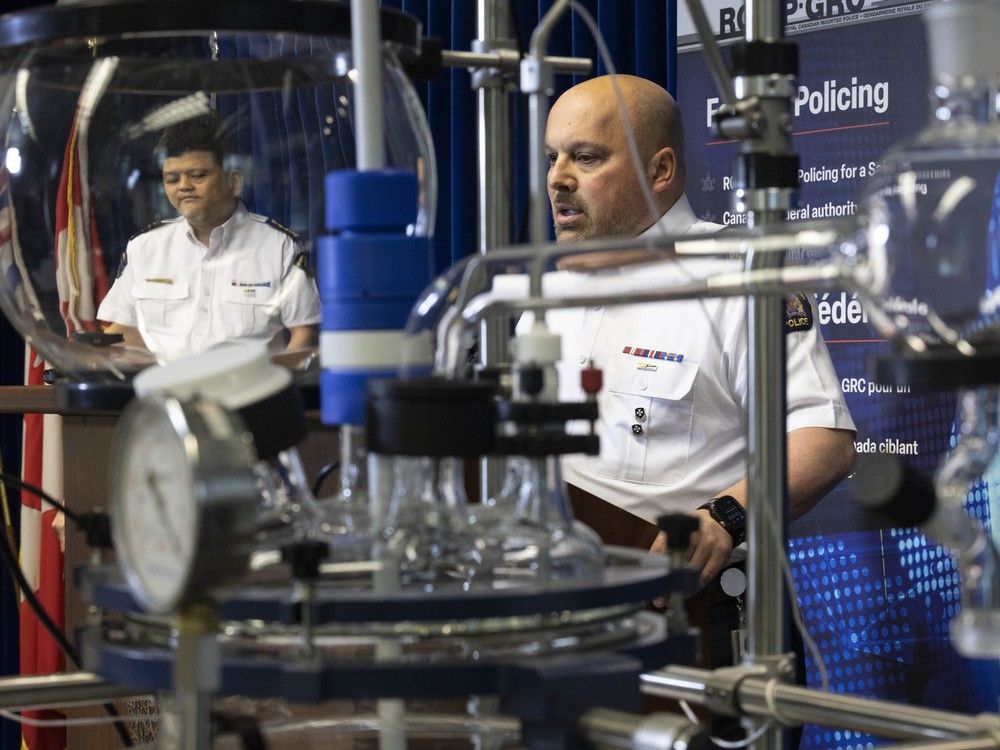Three Lower Mainland synthetic drug labs — two of which were making fentanyl — were dismantled in late March by the RCMP. Chief Supt. Stephen Lee of the federal policing program in B.
C. said “several million potentially lethal doses of fentanyl” were seized before they could be produced and distributed across Canada. Two people, including a suspected underground chemist, were arrested, but later released as the investigation continues.

Several locations were searched in Metro Vancouver, with labs found in Pitt Meadows, Mission and Aldergrove. Sophisticated lab equipment and precursor chemicals were seized. The labs were in commercial buildings close to residential neighbourhoods, though no exact addresses were provided.
“The discovery of commercial-grade chemistry equipment at all locations, in addition to the arrest of an individual who we suspect has a background in chemistry, points to a disturbing trend of progressively enhanced scientific and technical expertise, among transnational organized crime groups involved in the production and distribution of illicit drugs,” Lee said, standing by some of the fentanyl and equipment. RCMP Asst. Comm.
David Teboul said none of the fentanyl was destined for the U.S., though he wouldn’t say whether it would have been exported elsewhere or sold domestically.
“There continues to be no evidence, in this case and others, that these labs are producing fentanyl for exportation into the United States,” he said. “This investigation is ongoing, while the seized drugs, precursor chemicals and other evidence continue to be processed.” Teboul also declined to identify the group or groups involved aside from saying they were a B.
C.-based organized crime group with extensive connections in Canada and abroad. “This enforcement action is an example of how we counter fentanyl production at its source and continue to aggressively combat organized crime groups that are becoming increasingly more sophisticated in their scientific, and technical abilities,” Teboul said.
“The RCMP continues to disrupt the production of fentanyl that is impacting Canadian communities.” He also told reporters that the RCMP continues to meet with Health Canada about necessary changes to prevent legally imported equipment and chemicals from ending up in the hands of organized criminals. “These types of equipments here, while they’re used or have been used in the sophisticated production of synthetic drugs, they also have a legitimate, legal purpose,” he said.
Teboul also said legislative changes are necessary to better tackle transnational organized crime in Canada, but didn’t want to provide details during a federal election campaign. ”What I can tell you is that if you are you an organized criminal in this region who is operating a synthetic drug enterprise of this nature ..
. the RCMP will come after you. We won’t stop until we take it all down.
It is that simple,” he said. “These products, as we know, contribute to the health crisis. They contribute to taking the lives of British Columbians across our province and in all our communities and across the country.
That’s why this is a win.” The issue of fentanyl production and smuggling by Canadian organized criminals has become a flashpoint between the U.S.
and Canada since American President Donald Trump announced tariffs would be imposed on Canada because of its role in fentanyl smuggled south of the border. The U.S.
border patrol seized less than 20 kilograms of fentanyl from Canada in the 2024 fiscal year, while intercepting almost 10 tonnes headed north from Mexico. U.S.
law enforcement sources have told Postmedia News that they suspect the volume of Canadian fentanyl smuggled across the border is much higher. And the number of synthetic drug superlabs has been increasing in Canada and specifically in B.C.
The latest report from the Criminal Intelligence Service Canada noted that the number of organized crime groups involved in manufacturing synthetic drugs almost doubled over the last year from 51 in 2023 to 99 in 2024. Postmedia investigated the issue of so-called superlabs last fall, even before Canada’s largest was discovered in Falkland on Oct. 25, 2024.
The Falkland lab was set up by B.C.-based organized crime groups including the Wolfpack gang coalition.
[email protected] x.com/kbolan RelatedStudent 'likely would not have died' if UVic staff acted differently: reportTwo new genomics research projects in B.
C. aim to stay ahead of bird flu threat.
Politics

'We won't stop': Mounties shut B.C. fentanyl labs, vow to 'take it all down'

Several locations were searched, with labs found in Pitt Meadows, Mission and Aldergrove. All had sophisticated equipment and were close to residential neighbourhoods.















